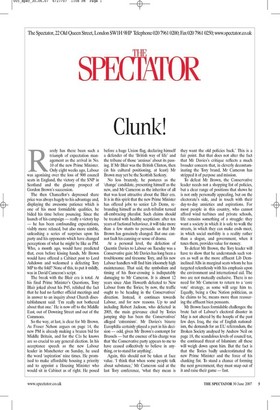Clunk!
Rarely has there been such a triumph of expectation management as the arrival in No. 10 of the new Prime Minister. Only eight weeks ago, Labour was agonising over the loss of 900 council seats in England, the victory of the SNP in Scotland and the gloomy prospect of Gordon Brown's succession.
The then Chancellor's depressed share price was always hugely to his advantage and, displaying the awesome patience which is one of his most formidable qualities, he bided his time before pouncing. Since the launch of his campaign — really a victory lap — he has been confounding expectations, visibly more relaxed, but also more nimble, unleashing a series of surprises upon his party and his opponents which have changed perceptions of what he might be like as PM. Who, a month ago, would have predicted that, even before kissing hands, Mr Brown would have offered a Cabinet post to Lord Ashdown and welcomed a defecting Tory MP to the fold? None of this, to put it mildly, was in David Cameron's script.
The break with the Blair era is total. At his final Prime Minister's Questions, Tony Blair joked about his P45, relished the fact that he had no further official meetings and in answer to an inquiry about Church disestablishment said: `I'm really not bothered about that one.' He is now off to the Middle East, out of Downing Street and out of the Commons.
So the way, at last, is clear for Mr Brown. As Fraser Nelson argues on page 14, the new PM is already making a brazen bid for Middle Britain, and for the Cis he knows are so crucial to any general election. In his acceptance speech as the new Labour leader in Manchester on Sunday, he used the word 'aspiration' nine times. He promised to make affordable housing a priority and to appoint a Housing Minister who would sit in Cabinet as of right. He posed before a huge Union flag, declaring himself a defender of the 'British way of life' and the tribune of those 'anxious' about its passing. If Mr Blair was the British Clinton, then (in his cultural positioning, at least) Mr Brown may yet be the Scottish Sarkozy.
No less brazenly, he postures as the 'change' candidate, presenting himself as the new, and Mr Cameron as the inheritor of all that was least attractive about the Blair era. It is in this spirit that the new Prime Minister has offered jobs to senior Lib Dems, rebranding himself as the arch-tribalist turned all-embracing pluralist. Such claims should be treated with healthy scepticism: after ten years of factional behaviour, it will take more than a few stunts to persuade us that Mr Brown has genuinely changed. But one cannot fault his cunning or sense of drama.
At a personal level, the defection of Quentin Davies to Labour on Tuesday was a Conservative gain: Mr Davies has long been a troublesome and tiresome Tory, and his new Labour handlers will find him irksomely high maintenance. That said, the symbolism and timing of his floor-crossing is indisputably damaging to Mr Cameron. It is almost 12 years since Alan Howarth defected to New Labour from the Tories; by now, the traffic ought to be heading in the Conservatives' direction. Instead, it continues towards Labour, and for new reasons. Up to and including Robert Jackson, who defected in 2005, the main grievance cited by Tories jumping ship has been the Conservatives' alleged 'extremism'. Mr Davies's bizarre Europhilia certainly played a part in his decision — odd, given Mr Brown's contempt for Brussels — but the essence of his charge was that `the Conservative party appears to me to have ceased collectively to believe in anything, or to stand for anything'.
Again, this should not be taken at face value. 'I think that when some people talk about substance,' Mr Cameron said at the last Tory conference, 'what they mean is they want the old policies back.' This is a fair point. But that does not alter the fact that Mr Davies's critique reflects a much broader concern that, in cleverly decontaminating the Tory brand, Mr Cameron has stripped it of purpose and mission.
To defeat Mr Brown, the Conservative leader needs not a shopping list of policies, but a clear range of positions that shows he is not only personally appealing, but on the electorate's side, and in touch with their day-to-day anxieties and aspirations. For most people in this country, who cannot afford wind turbines and private schools, life remains something of a struggle: they want a society in which it is safe to walk the streets, in which they can make ends meet, in which social mobility is a reality rather than a slogan, and government, when it taxes them, provides value for money.
To defeat Mr Brown, the Tory leader will have to show that he understands such voters as well as the more affluent Lib Deminclined ABs in marginal seats whom he has targeted relentlessly with his emphasis upon the environment and international aid. The two are not mutually exclusive. There is no need for Mr Cameron to return to a 'core vote' strategy, as some will urge him to. Equally, being a One Nation politician, as he claims to be, means more than reassuring the affluent bien pensants.
Mr Brown faces formidable challenges: the brute fact of Labour's electoral disaster in May is not altered by the hoopla of the past few days. Iraq, the rise of English nationalism, the demands for an EU referendum, the Broken Society analysed by Andrew Neil on page 18, the scandalous levels of council tax, the continued threat of Islamism: all these will weigh down upon him But the fact is that the Tories badly underestimated the new Prime Minister and the force of his clunking fist. To stand a chance of forming the next government, they must snap out of it and raise their game — fast.


















































































 Previous page
Previous page